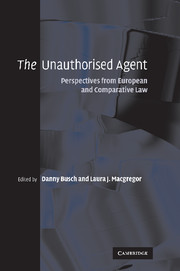Book contents
- Frontmatter
- Contents
- List of contributors
- Foreword
- Preface
- Abbreviations
- Table of cases
- 1 Introduction
- PART 1 The civilian legal systems
- PART 2 The common law
- PART 3 Mixed legal systems
- 9 Unauthorised agency in Scots law
- 10 Unauthorised agency in South African law
- PART 4 International ‘codes’
- PART 5 Conclusions
- Bibliography
- Index
9 - Unauthorised agency in Scots law
Published online by Cambridge University Press: 07 September 2009
- Frontmatter
- Contents
- List of contributors
- Foreword
- Preface
- Abbreviations
- Table of cases
- 1 Introduction
- PART 1 The civilian legal systems
- PART 2 The common law
- PART 3 Mixed legal systems
- 9 Unauthorised agency in Scots law
- 10 Unauthorised agency in South African law
- PART 4 International ‘codes’
- PART 5 Conclusions
- Bibliography
- Index
Summary
Introduction
In the Introduction to this book, Scots and South African law were described as ‘mixed’ legal systems: the product of civilian foundations overlaid by later common law influence. Agency law in Scotland reflects this ‘mixed’ nature. The first major source of Scots agency law is the body of work produced by the Scottish institutional writers, whose works are considered to be an actual source of law. The most notable of those writers, James Dalrymple, Viscount Stair, writing in the latter half of the seventeenth century, analysed the law of mandate in his Institutions. Throughout his title he makes frequent reference to Roman law, principally the Digest and Institutes. It is not surprising, therefore, that some of the solutions found there have a distinctly civilian flavour. Another institutional writer, George Joseph Bell, who produced the first edition of his book on what we would now call commercial law between 1800 and 1804, developed those early principles of mandate into a body of law which more clearly resembles modern agency law. In his works he makes extensive use of English case-law. Case-law, both Scots and English, is the second main source of agency law in Scotland. Indeed, the influence of English case-law has grown so that, today, English precedents are discussed as much if not more than Scottish ones in the Scottish courts.
The resultant ‘mixture’ poses a challenge to those seeking to analyse Scots agency law.
- Type
- Chapter
- Information
- The Unauthorised AgentPerspectives from European and Comparative Law, pp. 261 - 299Publisher: Cambridge University PressPrint publication year: 2009

